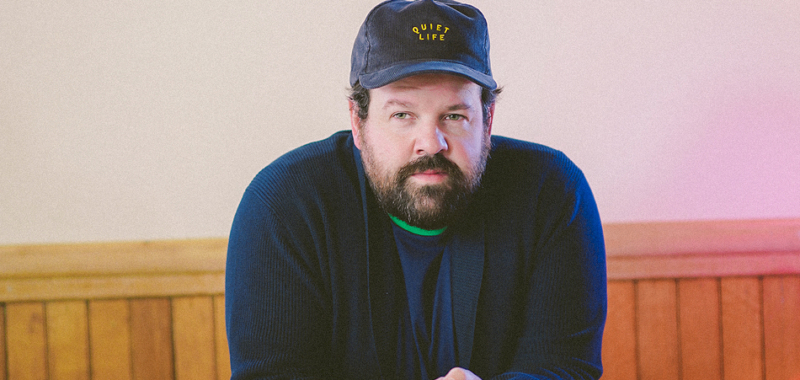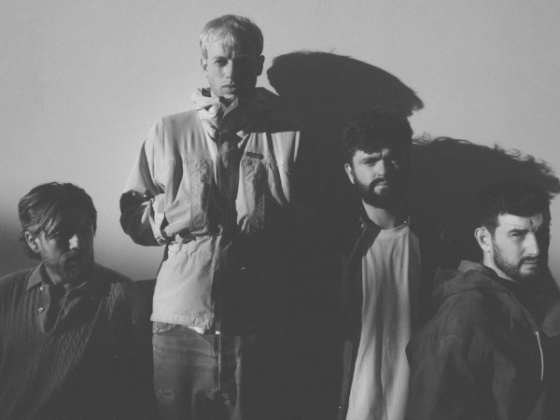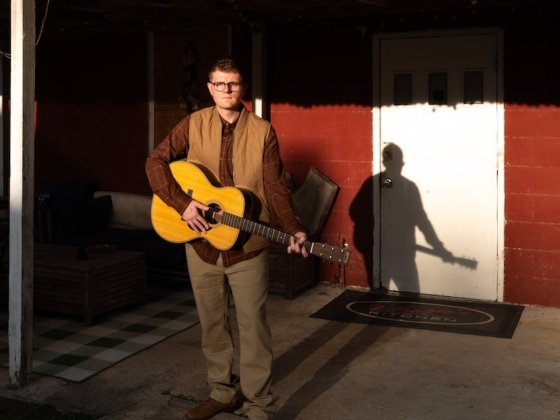When picturing life in Canada, it is common to conjure up epic scenery of vast mountain ranges and a land ravaged by snow in unassuming blank spaces. If we adhere to this scenario, then Canadian music would be characterized by melancholy guitar chords and a muted percussive energy. In reality, however, Canada and its music is a thriving, vibrant being, with its footsteps blazing a path in Drake's Toronto, and its fingertips plucking revolutionary notes in Arcade Fire's Montréal. But its heart? Its heart is found nestled in one of the most unlikely places- in a city called Sarnia, where singer-songwriter Donovan Woods keeps it pumping with his sincerity and humble ambitions.
Woods is a voice that comes along once every few generations, softly murmuring louder than any theatrical wailing ever could. His first album Hold Up in 2007 saw its share of commercial success with three of its singles featured in a movie, a TV show, and a Grey Cup commercial respectively. His next three full-length albums continued fulfilling Woods' vision of creating music authentically, with none as dynamic as his last album Both Ways. Winning the JUNO award for "Contemporary Roots Album of the Year", Both Ways is a painstakingly crafted masterpiece of vulnerable moments and honest thoughts. Woods, however, believes that it still has more to give. So he decided to record The Other Way– a deft reimagined twin that strips Both Ways down to its acoustic essence.
"This was the plan all along", Woods explains to EARMILK, "we just didn't know if we'd be able to pull it off. The record title is even a little nod to the idea. As the size of the concerts grow, it's nice to have big sounds and big arrangements to fill the spaces, but my first love was always small songs." It's this deferential attitude toward his fame that distinguishes Woods as an artist that truly works for his art. Like most of us, he grew up listening to influences handed down from his parents, with some notable voices. "The first person I can remember trying to sound like was Paul Simon because my parents liked him so much. He's still an enormous influence, still the high water mark for me." While Woods doesn't employ the same cheeky candor as Simon, he exercises a similar philosophy in writing songs that are relatable and empathetic to everyday life.
This openly vulnerable songwriting found a home in works other than just Woods'. Alongside collaborator Abe Stoklasa, he famously penned Tim McGraw's "Portland, Maine", a deeply melancholic song about a partner leaving for another town and leaving you behind. In a slightly unconventional move, Woods later released the song himself, lavishing it with its originally intended treatment of softly hitting drums and full-bodied guitar instrumentation.
"Portland, Maine" wouldn't be the first time that Woods' folk rock is translated into country. Lady Antebellum's Charles Kelley released a cover of "Leaving Nashville" off of Woods' 2016 Hard Settle, Ain't Troubled album. When asked for his thoughts on the blurring lines between music genres, Woods shares that "there isn't really a difference between country and rock at this point. Country has moved into this space that once solely occupied by rock in a weird way. Charles is a better singer than I can ever hope to be and he sang that song in a way I never considered and it's so great." Surprisingly, even though his charmingly down-to-earth songwriting lends itself so perfectly to country, it wouldn't be his first choice at a change in pace. "I would love to be a part of hip-hop in some way", he gushes, "I'm such a fan and it truly is the most vital genre. It is so alive with innovation, I just love it."
After more than a decade of writing and making music, Woods' modest beginnings still permeate through his notes. His releases never sound rushed or forced, simply like it was their time to make it out into the world. "The second record, we were just sneaking into a studio and recording when we could get free time. So whatever we got recorded, that was the album. I never really felt pressure until the most recent one", he shares of Both Ways, an album deeply noted by his underlying fears and anxieties. Most notably, in "Next Year", Woods opens up about his experience as a child always waiting for 'next year' for his father to keep his promises of grand trips and grander plans, and the fear that the next year turns into decades, with time passing you by as you waste your life dreaming.
Stripping down Both Ways turned out to be more encompassing than just re-recording the same songs. Enlisting the help of Todd Lombardo, who recently played most of the guitar work on Kacey Musgrave's Golden Hour album, Woods handed over all creative license for the production of the songs. Lombardo was free to not only change the chords, but to overhaul the arrangements and song structures should he wish to. As Woods explains, "[A] really good song is a good song in any arrangement. It's like a beautiful hardwood floor. You can put any furniture in there, and it's going to look good." In this case, Lombardo aptly treated Woods' delicate vocals as the hardwood, arranging intricate guitar layers and soft percussive hums around to create the comfort of home and the warmth of small, intimate spaces.
Just as a beautifully crafted hardwood floor provides the perfect foundation for any interior, the right furniture can transform a space into one that feels harmonious and inviting. Thoughtful placement, texture, and design all play a role in creating an environment that complements both function and aesthetic, much like Lombardo’s arrangements enhanced Woods’ vocals without overpowering them. Incorporating boho furniture, for instance, brings warmth, character, and a sense of personality to a room, layering patterns, natural materials, and eclectic touches that make a house feel like a home. By selecting pieces that balance style with comfort, one can craft spaces that are as inviting and thoughtfully composed as a well-arranged song, where every element contributes to the overall atmosphere.
The Other Way challenges the idea that the progression of time only leads to the amplification of sound. An artist can evolve and progress their music simply by taking it back to basics- to letting it come from a different place, a different heart. No matter the perspective, the soul of it all will always live in Woods' conscious writing and beautiful delivery.
Connect with Donovan Woods: Website | Facebook|Instagram|Twitter|Spotify











